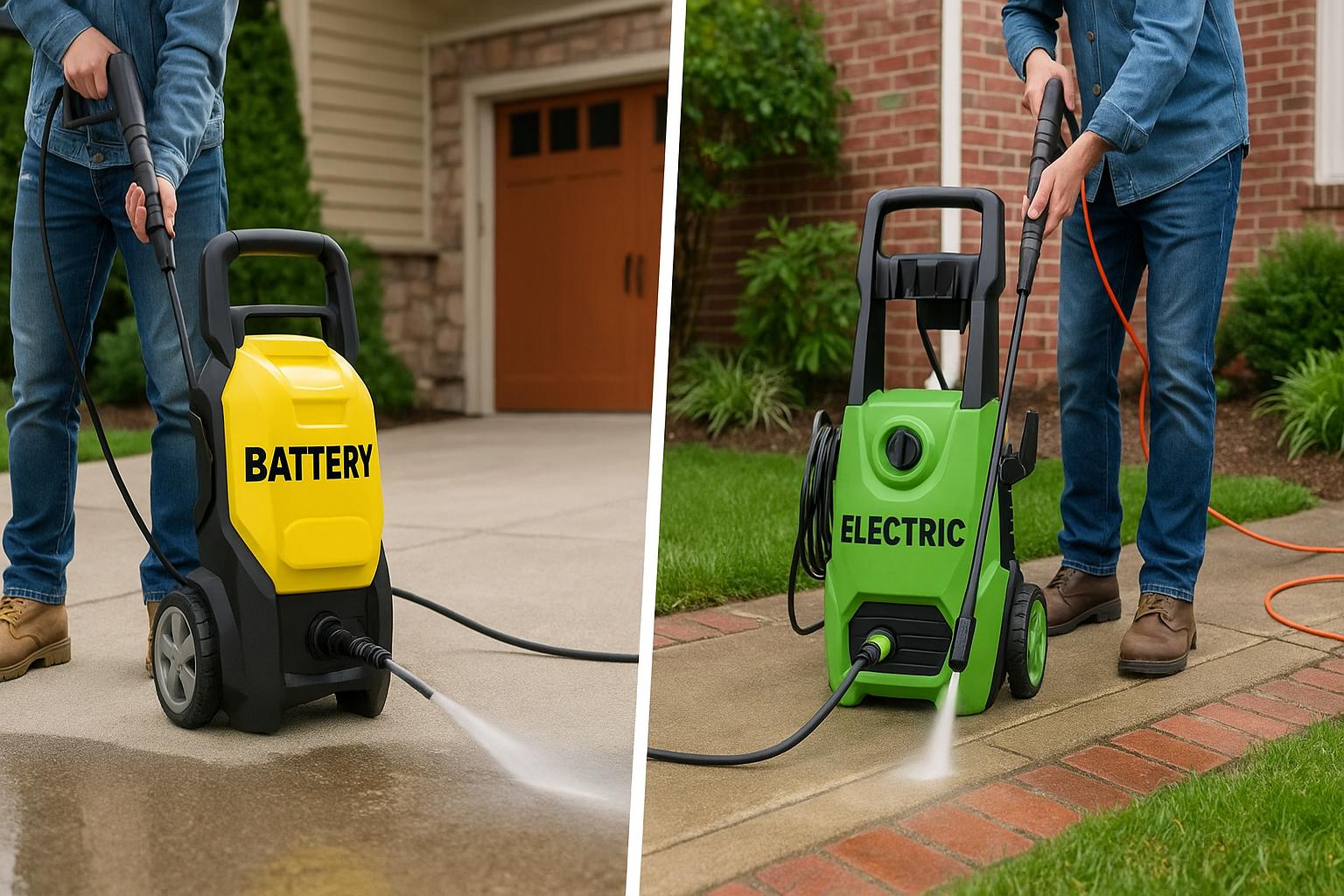Choosing the right pressure washer isn’t just a matter of convenience—it can significantly impact the quality of your cleaning, the time it takes, and the lifespan of your equipment. Whether you’re blasting mud off a tractor or rinsing mildew from your deck, the decision between battery and electric pressure washers isn’t as simple as “cord or no cord.” Both types serve different purposes, and if you’re unsure which one fits your needs, this blog will break it all down in clear, practical terms.
Let’s be honest: today’s buyers want performance, freedom of movement, and reliability. Yet these qualities don’t always come packaged together. That’s where the debate between battery and electric pressure washers heats up.
The Basics: What’s the Difference?
You must learn what makes each different before selecting one over the other. Electricity powers both battery and electric pressure washers, but the ways in which they get their power provide somewhat distinct results.
Electric pressure washers are instantly hooked into a wall outlet. This makes them ideal for locations near a power source, such as garages, patios, and driveways. They often offer steady performance and superior pressure production.
Battery pressure washers, on the other hand, make use of rechargeable lithium-ion batteries. As a result, they have a considerable advantage in portability. They can be transported to a far-off place, like a boat or a field. However, such independence comes with some trade-offs in terms of power and runtime.
Power Output and Cleaning Performance
Let’s talk about numbers. Electric pressure washers may often generate pressures between 1500 and 2500 PSI (pounds per square inch). Batteries usually come in 500–1500 PSI models. High-output batteries and brushless motors have advanced, but battery washers still don’t have the same raw power as their corded brothers.
Battery pressure washers are best suited for lighter cleaning tasks:
- Rinsing off dirt bikes or scooters
- Washing patio furniture or garden tools
Electric pressure washers, however, can handle tougher jobs like stripping paint, cleaning concrete, or prepping farm machinery. If you’re looking to buy Pressure Washer models with robust power, especially for outdoor agricultural tools or structures, electric options might give you the edge.
Mobility and Reach
Being cordless always seems better—until your battery runs out when you’re working on a task.
Devices that run on batteries are incredibly portable. You may move them to any location without having to look for outlets or carry extension cords across the yard. For this reason, they are popular for camping, RV repair, and off-grid applications.
The grounding of electric units is higher. Because you are attached to the wall socket, your working radius is constrained unless you have a lengthy extension cord. But after you’re connected, you won’t have to worry about power interruptions or charging cycles for hours.
Runtime and Charging Considerations
This is where expectations and reality often vary. Each charge of a battery washer typically lasts 20 to 45 minutes, depending on the model and power settings. The charging process could take one to three hours. If you don’t prepare ahead of time with extra batteries, you can find yourself in the middle of cleaning.
Electric pressure washers are able to run continuously. As long as there is electricity and water, they will keep running. For large-scale projects or professional use, this uniformity is crucial.
Here’s a brief change of viewpoint: Whether an electric or battery is “better” is not the point. It all comes down to which one suits your needs in terms of space, tasks, and
Water Source Flexibility
Self-priming capabilities allow battery-operated pressure washers to pull water from tanks, lakes, or buckets. For users in rural areas or anyone working far from a spigot, that is extremely important. These units are perfect for a variety of locations because of their lightweight frame, flexible hose, and small size.
A steady pressurised water supply from a hose is typically needed for electric models. If you’re off the grid or don’t have a conventional water line close by, that adds another layer of restriction. This isn’t an issue for permanent offices or suburban residences, though.
Maintenance and Durability
Compared to gas-powered models, electric pressure washers often have fewer moving parts and require less maintenance. Because of the battery packs, battery models introduce an additional level of complexity. You must keep an eye on performance deterioration over time, prevent overcharging, and maintain battery health.
Nevertheless, compared to gas models, both kinds are far simpler to maintain. There are no smells, no spark plug cleaning, and no oil change. You should think about the overall design, waterproofing, and construction quality, particularly if your washer will be exposed to the elements or be used frequently.
“Efficiency is doing things right; effectiveness is doing the right things.”
– Peter Drucker
Price vs. Value: Where’s the ROI?
Cost has a significant role. Battery pressure washers are frequently priced similarly to or marginally more expensive than equivalent electric equipment. Why? due to advancements in battery technology. Lithium cells with a large capacity are not inexpensive.
When used frequently for heavy tasks, electric washers typically offer better long-term value. They have an advantage in return on investment because to their durability, reliable performance, and more extensive feature sets (such as high-capacity motors and onboard detergent tanks).
However, a well-reviewed battery device can provide more convenience per dollar if you only require a washer a few times a month and enjoy the notion of not having to use cords.
For a deeper dive into specs, you might explore Consumer Reports’ pressure washer buying guide. It offers detailed comparisons across power types, brands, and use cases.
Sound and Environmental Impact
Electric and battery-operated washers are both noticeably quieter than gas-powered ones. Even though they hum regularly, electric models seldom ever disturb the quiet. They are a great option for condos, apartment balconies, or anywhere where noise is a concern because battery-operated models are whisper-quiet.
Both are clean energy choices in terms of the environment. For environmentally aware customers who wish to avoid dragging cords over natural landscapes, battery models offer a little more portability.
Who Should Choose Battery?
You should lean toward battery models if:
- You prioritize mobility over pressure.
- You clean small-to-medium surfaces like bikes, patios, or windows.
- You want off-grid capability for remote cabins, boats, or farming gear.
- You’re working in areas with limited power access.
Battery washers are perfect for quick weekend jobs. They’re modern, quiet, and simple to use. You won’t get deep industrial cleaning, but you’ll get freedom and flexibility.
Who Should Choose Electric?
Electric washers are the better choice if:
- You need sustained pressure for demanding tasks.
- You work near a reliable power outlet.
- You clean large surfaces like siding, concrete, fences, or vehicles.
- You don’t want to manage battery charging schedules.
For do-it-yourselfers, homeowners, and even certain commercial customers that require reliable performance, electric solutions are perfect.
Sixty-five percent of first-time pressure washer purchasers overestimate the amount of pressure they truly require, according to a recent industry poll. This frequently leads to the purchase of large, noisy, ineffective, and challenging-to-store models.
FAQs
- Do battery pressure washers lose power over time?
Yes, as the battery discharges, some models may experience a gradual drop in PSI. Premium models use smart circuitry to maintain consistent output. - Can I use a pressure washer with well water or a rain barrel?
Battery models that support self-priming can draw water from alternative sources, making them compatible with rain barrels, tanks, and lakes. - Are electric pressure washers safe to use in the rain?
It depends on the model. Look for washers with IP-rated waterproofing. However, avoid operating any electrical equipment in wet weather unless explicitly rated for it. - What accessories work with both types?
Nozzles, extension wands, foam cannons, and surface cleaners often work with both types, as long as the fittings are compatible. Always check PSI ratings to ensure accessory safety. - How long do batteries typically last in battery-powered washers?
Rechargeable batteries usually last between 300 to 500 cycles. With proper care, that can equate to 2–5 years of use.
Making the Smart Choice
Consider your usage style rather than making a decision only on the basis of specifications. Where are you going to use it? How frequently? How much downtime, noise, or setup time can you tolerate?
You shouldn’t let a brand-new pressure washer end up in your shed like any other gear. It should seem like a natural progression of your space’s upkeep and cleaning practices.
Checkout more blogs on backlinko.site


